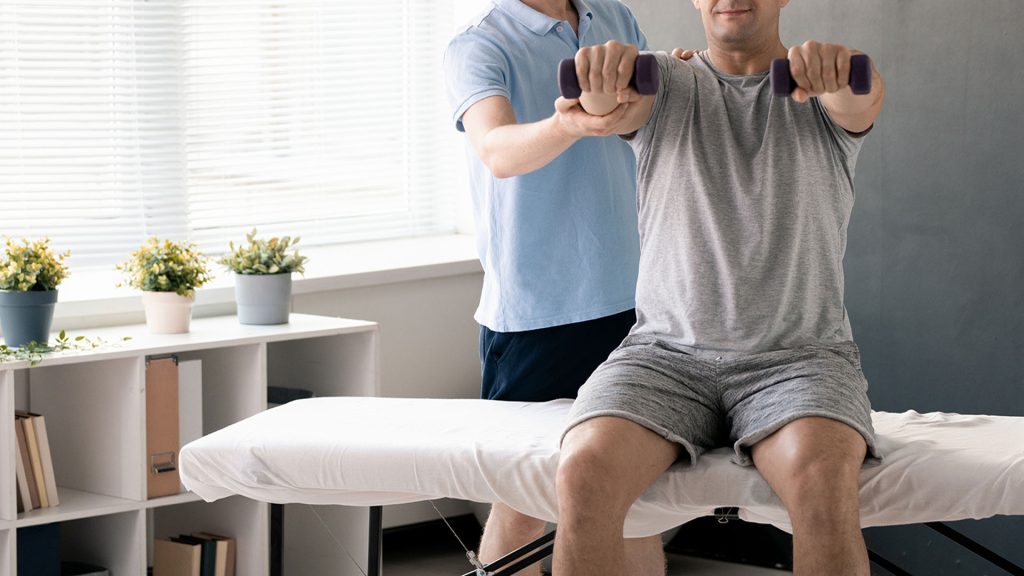When most people hear the term “sports medicine,” they picture elite athletes recovering from injuries on the field or training to boost performance. However, this medical specialty is far more inclusive than it sounds. Sports medicine is a dynamic field within orthopedics that focuses on treating a wide range of musculoskeletal conditions—not just in athletes, but in anyone seeking to regain or improve mobility, function, and quality of life.

What is Sports Medicine?
Sports medicine encompasses the prevention, diagnosis, and non-surgical treatment of injuries related to bones, muscles, joints, tendons, and ligaments. These injuries can occur during high-performance athletics, but they also commonly result from everyday activities like manual labor, gardening, or even routine office work.
Not Just for the Pros
According to Dr. Terrence Tsui, a Sports Medicine Physician at Bayhealth, sports medicine is designed to help all individuals—not just those in competitive sports. Whether you’re a construction worker recovering from a shoulder injury or a retiree wanting to walk your dog without hip pain, sports medicine can provide the care and treatment you need.
Conditions Treated in Sports Medicine
Sports medicine specialists deal with a variety of conditions that fall into two primary categories:
1. Acute Injuries
- Sprains and strains
- Dislocations
- Fractures
- Concussions
2. Chronic and Overuse Injuries
- Tendinitis
- Bursitis
- Arthritis
- Cartilage damage
- Repetitive motion disorders (e.g., carpal tunnel, tennis elbow)
These conditions often result in pain, inflammation, reduced range of motion, and decreased function. Patients typically experience difficulty performing daily tasks like climbing stairs, reaching overhead, or kneeling.
Diagnostic Tools in Sports Medicine
One of the most important aspects of sports medicine is accurate and timely diagnosis. Dr. Tsui employs advanced techniques like musculoskeletal ultrasound, which allows for real-time analysis of:
- Tendons
- Nerves
- Joints
- Ligaments
- Muscles
This method provides the benefit of an immediate diagnosis, eliminating the need for waiting days or weeks for MRI results.
Advantages of Musculoskeletal Ultrasound
- Real-time imaging
- Faster diagnosis and treatment
- Cost-effective
- No radiation exposure
Ultrasound-Guided Injections: Precision Pain Relief
One of the major innovations in non-operative sports medicine is the use of ultrasound-guided injections. Unlike traditional palpation-guided injections (where a physician feels for the injection site), ultrasound-guided injections use live imaging to ensure the medication is delivered precisely to the affected area.
Common Areas for Injections
- Shoulder (rotator cuff)
- Hip joint
- Knee joint
- Achilles tendon
Benefits
- Greater accuracy
- Reduced pain during injection
- Faster symptom relief
- Suitable for hard-to-reach joints
Non-Surgical Treatment Plans
Sports medicine practitioners like Dr. Tsui work closely with orthopedic surgeons and physical therapists to develop personalized, non-invasive treatment plans. Common modalities include:
- Physical therapy
- Strength and flexibility training
- Joint injections (cortisone, PRP)
- Medication management
- Bracing and support
Specialized Care: Concussion Management
Dr. Tsui also specializes in concussion care, helping patients recover from traumatic brain injuries due to falls, sports collisions, or accidents. Treatment includes:
- Symptom monitoring
- Cognitive rest
- Return-to-play/work protocols
- Coordination with neurologists if necessary
Who Should See a Sports Medicine Doctor?
Sports medicine is appropriate for:
- Active individuals of any age
- Workers injured on the job
- Retirees wanting to stay active
- Youths with sports injuries
- Anyone experiencing joint or muscle discomfort
Benefits Beyond Injury
Sports medicine is not only about treating injuries but also about preventing them. These specialists focus on:
- Biomechanical evaluations
- Customized exercise plans
- Lifestyle and ergonomic modifications
The Bottom Line
Sports medicine is for everyone—not just athletes. From acute injuries to long-term joint pain, this specialty helps individuals recover function, manage pain, and return to the activities they love. Thanks to non-surgical treatments like ultrasound diagnostics and guided injections, patients can experience quicker, more accurate, and less invasive care.
FAQs
What is sports medicine?
Sports medicine is a branch of orthopedics focused on diagnosing, treating, and preventing musculoskeletal injuries in both athletes and non-athletes.
Can non-athletes benefit from sports medicine?
Absolutely. Sports medicine can help anyone experiencing joint or muscle pain, regardless of their athletic background.
What conditions do sports medicine doctors treat?
They treat a wide range of issues, including sprains, fractures, arthritis, tendinitis, and concussions.
Are sports medicine treatments non-surgical?
Yes, many conditions can be managed without surgery through physical therapy, guided injections, and lifestyle changes.
What is an ultrasound-guided injection?
It’s a minimally invasive technique using live imaging to accurately deliver medication to painful joints or soft tissues.




